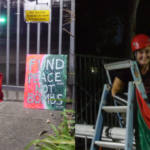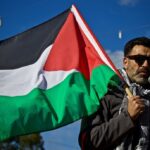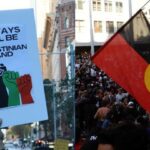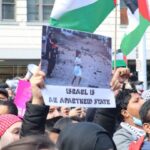Immediate Mass Mobilisation Required: A15 Action Naarm Activists on the Initial Escalation
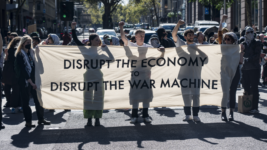
AFR had a report out by midday on Monday 15 April, which featured Melbourne businesses “bracing” for more disruptions that afternoon, as the morning saw successful disruptions across Naarm, whether that be of roads, retail outlets or weapons manufacturing facilities.
These A15 actions took place in economic centres nationally and indeed, worldwide, with the actions in Naarm carried out by autonomous pro-Palestinian activist groups, uniting to apply direct action, which was aimed at causing maximum economic harm to business, law enforcement and the state.
So, the Melbourne CBD was transformed into a huge protest site, with one mobilisation spending the entire day, from early morning to early evening, galivanting through the city to call for the end to the mass slaughter and starvation of Palestinians in the Israeli-perpetrated Gaza genocide.
And midday reports about the suffering of businesses only served to cement the determination of protesters calling for Palestinian liberation, as after six months of massive global grassroots mobilisations, the horror in Gaza is ongoing, and an escalation was warranted and continues to be.
Blocking the arteries of capital
The moving protest, which caused headaches in downtown Melbourne, saw an initial convergence at Parliament House, prior to coming together once more at different chokepoints throughout the city, and then descending upon a mall at one of the city’s main railway stations: Melbourne Central.
Other A15 Action Naarm protesters converged on Lorimer Street to block early morning peak hour traffic, near the Port Melbourne facility of US transnational weapons manufacturer Boeing. And police arrested a dozen participants for their troubles.
Hoddle Street, part of Melbourne’s Hoddle urban highway, is one of the city’s main thoroughfares and protesters brought its traffic to a resounding end, with the aim of causing economic chaos and disruption, in order to make the mass slaughter of innocent people economically unsound.
And “on Wurrundjuri Wooiworrung and Boonwurrung country, a group of activists in solidarity with Palestine blocked a freight train with the aim to stop railway traffic”. And the A15 Action protesters further covered the transportation vehicle in fake blood.
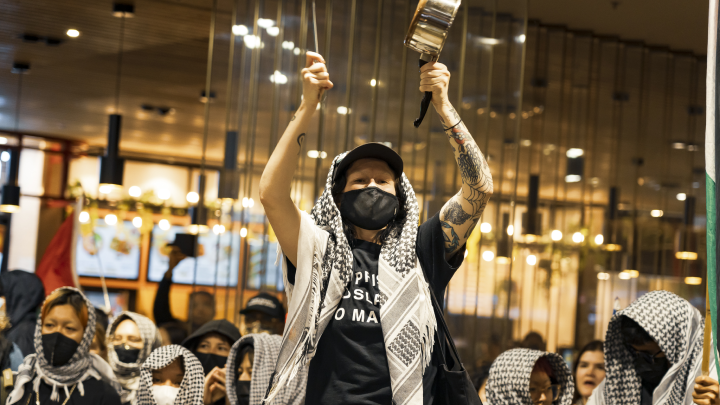
Necessitated escalation
Victoria police announced that it had been forced to pull at least 10,000 shifts from usual duties to police the nonviolent direct actions, and hundreds of officers had to be redeployed from regional areas. And whilst this was reported as problematic, it was in line with the disruptive aims of actions.
And despite being slandered in the media, the A15 Action Naarm protesters put on a monumental effort to successfully disrupt the city they live in, in order to cause economic harm because western interests are supporting the mass slaughter of a specific group because its profitable.
Sydney Criminal Lawyers put questions to the different groups involved in last week’s A15 actions in Naarm-Melbourne, and they answered back as one cohesive voice that has taken on the responsibility to assist in the stopping of a genocide, as governments are rather perpetuating it.
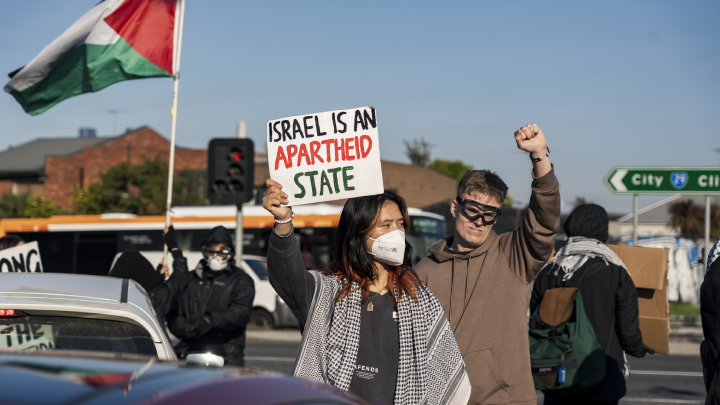
The A15 protests took place across the globe on 15 April, and Melbourne had been touted as a key city on a global circuit of actions.
The social media view of Naarm-Melbourne A15 events did convey what organisers had warned of: multiple direct actions causing mass disruptions across the city, which must have caused economic harm.
So, overall, what occurred across the Melbourne metropolitan area on Monday 15 April, in an attempt to force an end to the Israeli-perpetrated genocide in Gaza? And what was achieved?
Naarm being one of the first cities to begin actions for A15, due to time zones, brought with it a sense of responsibility to bring our energy to as many global actions as possible.
Melbourne, and the Victorian state government, has both military and political ties to Israel, and is allowing weapons parts to be manufactured and shipped, via Port Melbourne, to the apartheid state of Israel to be used to genocide and ethnically cleanse the Palestinian people.
Activists across Naarm-Melbourne understood the importance of cutting off that supply from a financial and material perspective and, as such, activists heeded the call of the international community.
On the 15th of April, independent autonomous activist groups across Naarm carried out multiple back-to-back disruptions throughout the city over a number of economic sectors, including disrupting weapons manufacturing, the Department of Foreign Affairs and Trade, BP Oil, significant road and transport routes, freight trains and Melbourne Central shopping centre.
With the responsibility on Naarm activists to kick off the global actions, there was also the need to communicate fast, quickly edit footage and media statements to show our support for every A15 action worldwide, regardless of the size or scale.
In Port Melbourne, activists coordinated a blockade of the Boeing facility on Lorimer Street for several hours, with several lock-ons interrupting the flow of traffic and access to the facility.
Activists on Hoddle Street in Abbotsford blocked several lanes during peak hour traffic, making a major Melbourne road come to a standstill.
A Pacific National freight train was blocked by activists on its way out of Port Melbourne and it was sprayed with red paint.
And in the CBD, a travelling rally moved and interrupted key roads, which continued through into the evening.
Activists gathered in Melbourne Central shouting chants, “While you’re shopping, bombs are dropping” and conducted a sit-in on level 2 of the shopping centre.
There were also several other rallies, including those at weapons manufacturers in less central locations.
The aim of the protest was to put financial pressure on government to unequivocally cut all military and diplomatic ties to Israel.
Disruptions like those of A15 intend to make it financially unviable for our government to continue supporting Israel.
The protests succeeded in putting financial pressure on the state government, including the allocation of rural police resources to Melbourne, resulting in several stations being understaffed and subsequently, closed overnight due to the protests.
The Port Melbourne blockade had a heavy police presence. Police used violent techniques to make twelve arrests, which included a bystander and a wheelchair user.
In Melbourne Central, police dangerously kettled protesters towards an exit, via a single escalator, and when protesters couldn’t move quickly enough out of the space, the police responded with violence, threats of OC spray and arrests. Two arrests were made.
Overall, across so-called Australia there were nineteen A15 actions and twenty-three arrests.
A15 was presented by global organisers as a change to the scope of the worldwide grassroots pro-Palestinian movement that has been mobilising over the last half year, with the general refrain being peaceful protest marches are no longer having enough impact, and therefore, an escalation is warranted.
Can you elaborate more on this idea, and what it might mean in terms of where responsibility is now being centred? And what sort of statement is being made here beyond the call for a ceasefire?
A15 has helped autonomous groups form connections and alliances not just on a state or national level, but globally.
Global connections made during A15 have provided energy, innovation and a sharing of perspectives from experiences we’ve not directly been subjected to.
The public are quickly realising that the promise of their “democratic governments” over the years are empty.
The government wants you to apply for a permit to exercise your rights to have a state-sanctioned parade.
Historically, the largest protests of these kind in Australia’s history were those opposing Australia’s involvement in Iraq and Afghanistan, but these protests didn’t result in meaningful action from the Australian government.
The Australian government has a vested financial and political interest in maintaining “business as usual”, which involves supporting Israel’s occupation of Palestine and the genocide of the Palestinian people.
In a capitalist society, the governments’ morals and values are always for sale to the highest bidder, which tends to be corporate lobbyists.
Profit will be valued over all else, including human life. When you threaten their profits, your human rights and right to protest no longer exist.
We have seen what our governments’ priorities are and where their loyalties lie, and protesters are done playing their game and applying for their permits.
Protestors are no longer asking for permission, and until our government listens to the people, we will continue to disrupt their profits and business as usual.
We call on the Australian government both at the state and federal level to unequivocally cut all military and diplomatic ties with Israel and call for an unconditional, permanent ceasefire.
Thinking on a global level, we no longer call for a ceasefire alone, we call for liberation.
We call for “Israel” to be held accountable for committing human rights violations, genocide and occupying stolen land.
We also call for liberation for all cultural groups being inflicted with genocide and occupation, not only Palestine.
This is a global responsibility: immediate mass mobilisation is absolutely required.
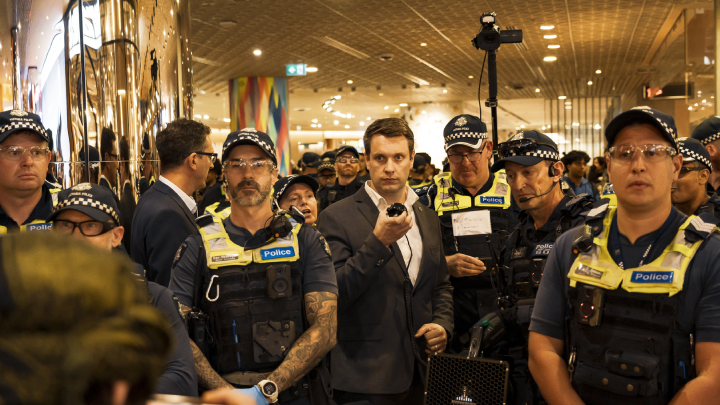
Each of the events across the globe were aimed at placing pressure on Israel to stop the genocide in Gaza, but they were further focused on the global system facilitating the mass atrocity, and ultimately, they had the focus of applying pressure to local powers that be.
What is it about the actions of Australian authorities that warrant such demonstrations now? And why was an A15 focus warranted in Naarm?
The Australian government has trade and weapons parts manufacturing agreements that directly profit from the ongoing genocide and occupation of Gaza.
For just one example, Australia joined the global F-35 strike fighter jet program in 2002, and now, more than 70 companies operating within Australia are involved in the F-35 supply chain at every stage of production.
This includes providing raw materials, engineering and design, component manufacturing, software development, flight equipment, jet fighter training, repairs and maintenance.
Many of these companies have headquarters and key facilities right here in Naarm, as well as in regional Victoria.
Every F-35 in the world is only able to fly and drop bombs because it contains parts made right here.
Many manufacturers for other weapons parts and military software used in Israeli apartheid and ethnic cleansing of Palestinians, also have facilities and offices throughout Naarm, along with other globally harmful corporations, like BP Oil.
We can’t call a government profiting from genocide “complicit”, as this implies indifference.
We have seen Victoria police demonstrate time and time again a value of profit over people: over resourcing peaceful protests and direct actions with highly reactive Public Order Response teams, using life endangering tactics against peaceful protesters.
Over the past six months, we have Victoria police escalating their violence towards protesters, using dangerous kettle and arrest techniques.
We’ve witnessed and been victims of some of these techniques.
We’ve seen a large police officer pick up and slam a protestor face down into road surface, place their knee and body weight upon the upper back region of the protestor, while pulling the protestor’s arms tightly up and behind their body.
This person was unable to breathe fully and the risk to their neck and spine was significant.
On A15, the Port Melbourne blockade had a heavy police presence. Police used violent techniques to make twelve arrests, which included a bystander and a wheelchair user.
In Melbourne Central, police dangerously kettled protesters towards a single escalator, and when protesters couldn’t move quickly enough out of the space, the police responded with violence, threats of OC spray and arrests. Two arrests were made.
A15 was not only warranted in Naarm but globally. And we have a global responsibility to demand our governments actively intervene and stop the ongoing genocide in Palestine and to hold participating corporations responsible.
The first interview I conducted with Naarm’s pro-Palestinian protest movement was in December, and it’s been mobilising since last October.
Somewhat incomprehensibly the Gaza genocide has been going on for six months now.
How has the Naarm pro-Palestine movement changed and developed over that time? And why is it in the best interests of the Victorian authorities to see an end to the military action in Gaza in terms of then ongoing protest movement on the city streets?
We have noticed significant growth in community care throughout Naarm. The movement has placed so many passionate and caring people in one space, these people have skills that can be shared and traded.
We are crowdsourcing supplies and creating upskill sessions not only where it comes to direct actions but in everyday life.
We’ve seen people offering help with meals, cleaning, carpooling and education. There have been call outs for blankets and supplies for people sleeping rough.
We’ve seen sharing fund transfer information for people in crisis, so they can receive the funds directly and immediately.
These community structures have always existed, but we now have huge numbers sharing the information and call outs.
This movement hasn’t just mobilised people to direct action and protest, it’s creating resilient independent communities. We are changing the ideas of authority and government.
The Sunday protests still hold importance for keeping the public visually aware of an ongoing genocide. These protests also provide a space for differing access and comfort levels and children to attend.
There is always more work to be done for accessibility, including within activist and protest spaces.
We simply will not stop until Palestine is liberated. Governments have demonstrated their complete disregard to our calls to end the genocide.
Global economic disruption is a strong and a successful approach for our voices to be heard and taken seriously.
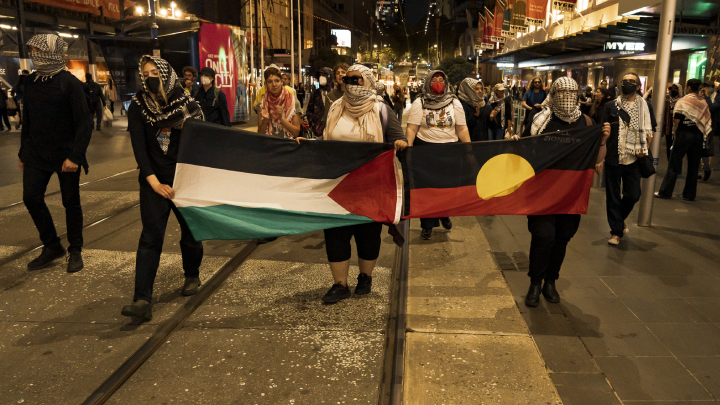
A15 was a global event. I woke up the next day, with social media channels flooded with posts about global actions, with one that stood out being a road demonstration blocking traffic entry into O’Hare International Airport in Chicago.
What happened globally on Monday 15 April 2024? And how did the fact that this was being carried out across the planet impact what was being staged in Naarm?
There was a boost in energy knowing this was a global movement. Activists were quick to respond and organise creating multiple plans and ideas to complement actions in other countries.
Activist groups within Naarm always have amazing energy and ideas for protests, pickets and actions. But knowing A15 was a global coordinated movement, where Naarm was in the first time zone, saw new groups created and collaborations forming.
There were actions from bridge banner drops in Naarm, to stopping access to three terminals at Chicago O’Hare International Airport and a blockade of the Golden Gate Bridge.
Significantly, we watched a banner drop at the Supertree Observatory in Singapore, which left us in awe and feeling inspired.
Not only did A15 bring global attention to Palestine, but new people saw A15 as a moment to enter the pro-Palestine space: some who hadn’t been to a protest or direct action before but had a commonsense of helplessness and anger at the continuous bombardment of Palestine.
And lastly, A15 marked an escalation because the Gaza genocide continues six months on.
Governments like ours have been supporting the colonial massacre, and the significant mass protest marches are no longer seen as enough.
But in staging the mass escalation, there seemed to be implied within it the message that further such direct actions will be forthcoming if aims are not achieved.
What do Naarm’s pro-Palestinian agitators foresee up ahead if events continue to transpire along the dystopian path they’re currently on?
If there is no real action from governments to actively put a stop to the genocide in Palestine, the movement will continue to coordinate globally and grow. There will be longer and more sustained economic disruptions and boycotts.
Victorian police commissioner Shane Patton, commenting on A15, said protesters “don’t even know what they’re protesting”.
To this, we reply: Shane, not only do we understand what we are protesting, but we’re fighting for a future where your supremacist colonial mindset and structure doesn’t exist.


